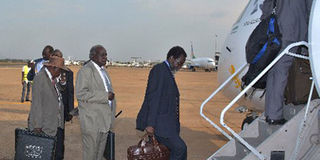S. Sudan rivals delay direct talks

Members of the delegation representing the government of South Sudan board a plane at Juba International Airport on January 2, 2014 headed for Addis Ababa. Warring parties in South Sudan delayed direct peace talks on January 4, 2014, dashing hopes of a swift ceasefire to end raging fighting and risks of a slide into all-out civil war. PHOTO | AFP
What you need to know:
- No timeline has been set for the crucial face-to-face talks to begin, despite the teams having already spent three days in the same luxury hotel in neighbouring Ethiopia’s capital Addis Ababa
- President Salva Kiir against a loose alliance of ethnic militia forces and mutinous army commanders nominally headed by his rival, former Vice President Riek Machar
- In Addis Ababa, there appeared to be little sign that the peace process would proceed swiftly
ADDIS ABABA
Warring parties in South Sudan delayed direct peace talks on Saturday, dashing hopes of a swift ceasefire to end raging fighting and risks of a slide into all-out civil war.
While top leaders of the government and rebel teams have briefly met directly, the rivals continued on Saturday to hold separate talks with negotiators.
No timeline has been set for the crucial face-to-face talks to begin, despite the teams having already spent three days in the same luxury hotel in neighbouring Ethiopia’s capital Addis Ababa.
“I don’t think there’s anything to indicate that the talks are breaking down,” said Hussein Mar Nyout, former deputy governor of Jonglei state and a rebel delegation member after the delay was announced.
“Mediators are today finishing consultations with the groups, adjusting the agenda... then they will call for the launch of talks.”
Since the conflict erupted on December 15, thousands of people are feared to have been killed in the fighting, pitting army units loyal to President Salva Kiir against a loose alliance of ethnic militia forces and mutinous army commanders nominally headed by his rival, former Vice President Riek Machar.
On Saturday, the army battled to wrest back from rebels the strategic town of Bor, capital of Jonglei, one of the country’s largest states.
“Our forces are still moving towards Bor,” army spokesman Philip Aguer told AFP, dismissing rebel claims they had been marching on the capital Juba.
There were reports of intense battles involving tanks and artillery on the outskirts of Bor, which has already exchanged hands three times since fighting began almost three weeks ago.
STAFF EVACUATION
The US embassy in South Sudan ordered a further pull out of staff on Friday because of the “deteriorating security situation”, although Washington — a key backer of the fledgling state — insisted it remains committed to ending the violence.
The ongoing fighting prompted the top UN aid official in South Sudan, Toby Lanzer, to warn that soldiers and rebels must protect civilians and aid workers.
“More people arrived at our bases in Juba... we’re up to 30,000 in the capital alone,” Lanzer said, calling the conflict-zone south of Bor “fluid”.
He announced on Saturday that the UN peacekeeping force (UNMISS) would be “reinforcing its presence” in the country.
“Some reinforcements have already arrived,” an UNMISS statement said. “This coming week, additional aircraft are arriving to assist with transport of essential supplies to troops and civilians.”
In Addis Ababa, there appeared to be little sign that the peace process would proceed swiftly.





